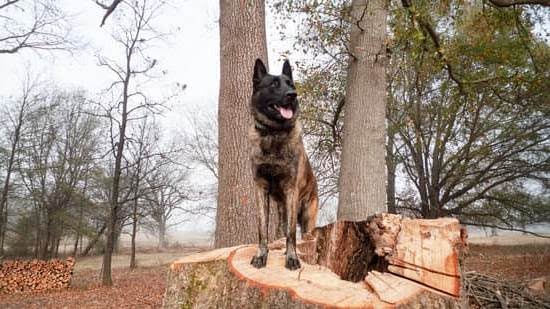Are you interested in learning how to become a dog trainer for police? The role of a police dog trainer is crucial to law enforcement, as these specially trained canines play a vital role in search and rescue operations, drug detection, and apprehending suspects.
In this article, we will explore the necessary qualifications and experience needed to excel in this profession, the specific training methods used in preparing dogs for police work, as well as the physical and mental requirements essential for success in this field.
Becoming a dog trainer for police requires a unique set of qualifications and experience. In addition to an educational background in animal behavior or related fields, individuals pursuing this career path typically need certifications in dog training and previous experience working with animals. It’s essential to understand the specific demands of police dog training and be prepared to meet them through dedicated training.
Police dog training involves teaching canines obedience, scent detection, tracking, and patrol work. The methods and techniques used are tailored to prepare dogs for real-life law enforcement situations. Aspiring trainers must have a thorough understanding of these training methods and be prepared to adapt their approach based on the unique needs of each canine trainee.
The Qualifications and Experience Needed
Becoming a dog trainer for police is a highly specialized and demanding career that requires specific qualifications and experience. In order to work in this field, individuals must have a strong educational background, relevant certifications, and previous experience working with dogs. While there are multiple paths to becoming a police dog trainer, certain requirements are essential for success in this role.
One of the most common educational backgrounds for aspiring police dog trainers is a degree in animal behavior, psychology, or a related field. Additionally, obtaining certifications from reputable dog training organizations such as the International Association of Canine Professionals (IACP) or the Certification Council for Professional Dog Trainers (CCPDT) can demonstrate a commitment to professional development in the industry.
Moreover, previous experience working with animals or law enforcement agencies can help provide valuable insight into the expectations and demands of the job.
In addition to formal education and certifications, individuals interested in becoming a police dog trainer should seek out mentorship opportunities with experienced professionals in the field. Gaining hands-on experience through internships or apprenticeships can be invaluable in developing the practical skills necessary for success.
It is also important to stay updated with the latest advancements and best practices in canine training through continuous learning and professional development opportunities. By investing time and effort into building a strong foundation of qualifications and experience, aspiring dog trainers can position themselves for a rewarding career in law enforcement.
| Qualifications | Experience |
|---|---|
| Degree in animal behavior or psychology | Previous experience working with animals or law enforcement |
| Certifications from IACP or CCPDT | Mentorship opportunities with experienced professionals |
Understanding Police Dog Training
Becoming a dog trainer for the police force is a challenging but rewarding career path. It requires dedication, a specific skill set, and a deep understanding of canine behavior. Police dogs are essential to law enforcement operations, and the role of a dog trainer is crucial in ensuring these canines are well-prepared for their duties. Understanding the specific training methods and techniques used in training dogs for police work is an important aspect of this career.
To become a dog trainer for the police, one must have the right qualifications and experience. This typically includes obtaining a high school diploma or GED, followed by completing specialized training programs in dog handling and training. Additionally, obtaining certifications from reputable organizations such as the National Association of Professional Canine Trainers (NAPC) or the Certification Council for Professional Dog Trainers (CCPDT) can greatly enhance one’s credibility and expertise.
Police dog training involves various specialized areas such as obedience, scent detection, and patrol work. These methods require comprehensive training techniques that are tailored to meet the specific needs of law enforcement duties. Some common methods used in police dog training include positive reinforcement, clicker training, and agility drills. This specialized training equips dogs with the skills needed to assist law enforcement in tasks ranging from narcotics detection to criminal apprehension.
In addition to mastering training techniques, aspiring police dog trainers must possess physical and mental attributes that are crucial for excelling in this role. Endurance, agility, quick thinking, problem-solving skills, and stress management are essential traits that will enable trainers to effectively train police dogs for real-life scenarios they may encounter on duty.
Aspiring trainers should also be prepared to handle high-stress situations with composure and authoritative leadership to ensure that both the dogs and their handlers can perform their duties effectively under pressure.
Physical and Mental Requirements
Becoming a dog trainer for the police force requires a unique combination of physical and mental attributes. In addition to possessing a deep understanding of dog behavior and training techniques, individuals aspiring to pursue this career path must also demonstrate exceptional physical and mental capabilities. The rigorous demands of working with police dogs necessitate that trainers possess the endurance, agility, and resilience needed to excel in high-stress situations.
Physical fitness is a crucial aspect of being a successful police dog trainer. The ability to keep up with the energy and strength of working dogs is vital, as they are often trained in physically demanding tasks such as apprehension work and search operations.
Trainers must have the stamina to keep pace with these highly active animals, as well as the strength to control them when necessary. Agility is also essential, as trainers need to be able to move quickly and nimbly during training exercises and deployments in the field.
Furthermore, the role of a police dog trainer entails working in high-pressure environments where split-second decision-making may be required. As such, individuals pursuing this career should possess strong mental fortitude and an ability to remain composed under stress. This includes having exceptional problem-solving skills, quick thinking abilities, and the capacity to handle unexpected situations effectively. A calm demeanor and emotional resilience are paramount when dealing with potentially dangerous or volatile scenarios.
The Training Process
Becoming a dog trainer for the police requires dedication, hard work, and a commitment to excellence. It is an important role within law enforcement, as these skilled canines play a crucial part in keeping communities safe.
Those who are interested in pursuing this career path must understand that it requires a specific set of qualifications, experience, and knowledge. This section will outline the step-by-step process of how to become a dog trainer for the police and explore potential career paths and advancement opportunities within the field.
Educational Background and Certifications
To become a dog trainer for the police, individuals typically need to have a strong educational background in animal science, behavioral psychology, or a related field. Many aspiring police dog trainers pursue degrees in animal behavior or attend specialized dog training programs that focus on working with law enforcement dogs.
Additionally, obtaining certifications from organizations such as the National Association of Canine Scent Work (NACSW) and the Certification Council for Professional Dog Trainers (CCPDT) can further enhance one’s credentials in this competitive field.
Experience Required
Gaining practical experience is crucial for aspiring police dog trainers. Many individuals start their careers by working as K9 handlers or assistant trainers at law enforcement agencies or private dog training organizations. This hands-on experience allows them to develop valuable skills in obedience training, scent detection work, and patrol training under the guidance of experienced professionals.
Career Paths and Advancement Opportunities
Once individuals have acquired the necessary qualifications and experience, they can pursue various career paths within the field of police dog training. Some may choose to specialize in specific areas such as explosive detection or search-and-rescue operations, while others may aspire to advance into leadership positions such as head trainer or K9 unit supervisor within law enforcement agencies.
Continual professional development through workshops, seminars, and advanced training programs can also open up new opportunities for growth and advancement within this rewarding profession.
By following this step-by-step process and continuously honing their skills, dedicated individuals can achieve their goal of becoming successful dog trainers for police departments and make a valuable contribution to public safety.
Building a Strong Foundation
Becoming a dog trainer for the police is an exciting and challenging career path that requires a strong foundation in dog training. Aspiring trainers must understand the importance of building this foundation to succeed in training dogs for police work. Building a strong foundation involves acquiring relevant skills, knowledge, and experience, which are essential to prepare for the responsibilities of working with police dogs.
Developing Strong Training Skills
To become a successful police dog trainer, individuals must develop strong training skills that encompass obedience, scent detection, and patrol work. This involves understanding canine behavior, learning effective communication techniques with dogs, and mastering various training methods. Building a strong foundation in these skills will enable aspiring trainers to effectively train and handle police dogs in real-world situations.
Educational Background and Certifications
One of the first steps to building a strong foundation as a police dog trainer is obtaining the necessary educational background and certifications. Pursuing a degree in animal science or a related field can provide valuable knowledge about animal behavior, physiology, and training methods. Additionally, obtaining certifications from reputable organizations such as the National Association of Canine Scent Work (NACSW) or the Certification Council for Professional Dog Trainers (CCPDT) can demonstrate expertise and dedication to the profession.
Practical Experience
In addition to education and certifications, practical experience is crucial for developing a strong foundation as a police dog trainer. Gaining hands-on experience through internships, volunteer work at animal shelters or rescue organizations, or apprenticeships with experienced trainers can provide invaluable exposure to working with dogs in various capacities. Practical experience allows aspiring trainers to apply their knowledge in real-world settings and gain insight into the specific challenges of training dogs for police work.
By focusing on developing strong training skills, obtaining relevant education and certifications, and gaining practical experience, individuals can build a solid foundation in dog training that will prepare them for success as police dog trainers. Building this foundation is essential for aspiring trainers who aspire to make a meaningful impact in law enforcement through their work with highly skilled police dogs.
Career Outlook and Job Opportunities
Becoming a dog trainer for police is a career path that requires dedication, passion, and the right qualifications. To start your journey towards this exciting and challenging profession, it’s essential to understand the qualifications and experience needed to succeed in this role.
A high school diploma or GED is typically the minimum educational requirement, but many aspiring police dog trainers pursue higher education in fields such as animal behavior, psychology, or criminal justice. Additionally, obtaining certifications from reputable organizations, such as the National Association of Professional Canine Handlers (NAPCH) or the Certification Council for Professional Dog Trainers (CCPDT), can enhance your credibility and open up more job opportunities in the field.
Another crucial aspect of becoming a successful dog trainer for police is developing a deep understanding of police dog training methods and techniques. This includes obedience training, scent detection, patrol work, and more. With an emphasis on positive reinforcement and effective communication with canine partners, police dog trainers play a pivotal role in ensuring that K9 units are well-prepared for their duties in law enforcement.
Aside from technical skills and knowledge, physical and mental attributes are also important for excelling in this career. Police dog trainers need to possess high levels of endurance, agility, and the ability to remain calm under pressure during high-stress situations. The physical demands of handling large and powerful dogs must not be underestimated as well. Aspiring trainers should also be prepared to undergo rigorous physical training to build strength and stamina for working alongside their canine partners.
| Educational Background | Minimum of High School Diploma or GED; Higher Education in Related Fields Such as Animal Behavior or Criminal Justice |
|---|---|
| Certifications | NAPCH or CCPDT certifications are recommended |
| Training Methods | Obedience training, scent detection, patrol work; Emphasis on positive reinforcement methods |
| Physical & Mental Attributes | Requirements include endurance, agility; Ability to handle high-stress situations calmly; Rigorous physical training may be necessary |
Conclusion
In conclusion, becoming a dog trainer for the police is a rewarding and challenging career path that requires dedication, perseverance, and a genuine love for working with animals. The role of a police dog trainer is crucial in law enforcement as these highly trained canines play a vital role in helping to keep our communities safe.
As outlined in this article, the qualifications and experience needed to pursue this career are substantial, but with the right mindset and determination, it is definitely attainable.
For those aspiring to become a dog trainer for the police, it is important to start by gaining a solid foundation in dog training and behavior. Pursuing education in animal sciences or related fields, obtaining certifications from reputable organizations such as the International Association of Canine Professionals (IACP), and gaining hands-on experience working with dogs are all essential steps in building a successful career as a police dog trainer.
Moreover, understanding the specific training methods used in police dog training such as obedience, scent detection, and patrol work will be critical for success.
It is also important to note that physical and mental attributes such as endurance, agility, and the ability to handle high-stress situations are equally important in this field. With determination and hard work, individuals who are passionate about working with dogs can indeed find fulfillment in becoming a dog trainer for the police force. This career choice offers not only personal satisfaction but also provides an invaluable service to society through ensuring public safety.
Frequently Asked Questions
How Long Are Most Police Dog Training Programs?
Most police dog training programs last between 6 to 14 weeks, depending on the specific skills and tasks the dogs will be trained for. The training includes obedience, scent detection, apprehension, and more.
What Are Trained Police Dogs Called?
Trained police dogs are usually called K9s, which stands for “canine.” This term is used to distinguish them from regular pet dogs and emphasizes their working role in law enforcement.
What Can Police Dogs Be Trained In?
Police dogs can be trained in a variety of skills and tasks, including obedience, agility, scent detection (such as explosives or narcotics), apprehension or bite work, search and rescue operations, tracking suspects or missing persons, and even crowd control. Each dog may have specific specialties based on the needs of their police department or agency.

Welcome to the blog! I am a professional dog trainer and have been working with dogs for many years. In this blog, I will be discussing various topics related to dog training, including tips, tricks, and advice. I hope you find this information helpful and informative. Thanks for reading!





